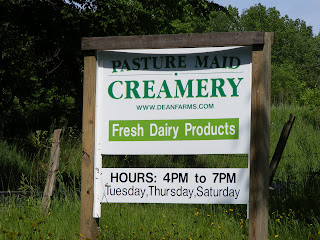[The following story originally appeared on my LiveJournal weblog in June of 2009. I am including an updated version here. This is how I buy my milk semi-locally for a bunch of recipes--such as paneer, hollandaise, alfredo sauce, and artisan breads. I will be writing about some of these recipes in the near future. OBLIGATORY DISCLAIMERS -- 1. Do NOT consume raw milk if you have a weak or compromised immune system. (Of course, if you make it into cheese or sauce, or you bake with it, it's no longer raw, is it?) 2. In the U.S., the legality of retail sales of raw milk to consumers varies from state to state. To check out the legality of buying raw milk in your state, click here: Raw Milk National map.]
My first trip to Pasture Maid Creamery came last fall [2008]. At that time, my housemates and I were already regular raw milk customers of the farm. I also played the role of "middleman" to two (sometimes three) other customers on Youngstown's north side.In that first visit, I met two of the dairy cows who gave the milk. This summer--June 6th and June 13th [2009]--I did not get to see any full-grown cows because they were out in the pasture, beyond the view of my camera, but I did meet their daughters, whom I assume will be providing the milk later this year.
[This babble continues....]
Here are a few glamor shots of the newer girls, taken June 6th [2009]:
 |
| Shy cutie. |
 |
| Napping cutie. |
 |
| Gregarious, friendly cutie. "Got grass?" she asks. "Any alfalfa?" |
There is, obviously, a lot of controversy about raw milk, just as there is controversy about allowing people to eat rare steak or uncooked egg yolks. Humans get sick from food, sometimes. If the food or the animals the food comes from are not handled properly, or if the person consuming the food has a compromised immune system, getting sick is even more likely. However, raw milk and meat and eggs are not the enemies. People can get sick from raw vegetables, too. People can get sick from breathing fouled air. It's not the food, it's the methods used to deliver the food. And it's how our bodies react. Face it: Surviving lunch is not guaranteed, never has been.
When my housemates first started bringing raw milk home, I had no worries. I've never gotten sick from raw milk in any of its forms, and some of the conditions in which I've consumed raw milk in the past were less than (in a modern, American sense) ideal and at least one source (someone's pet cow in an Illinois suburb in the late '70s) was probably illegal. What can I say? Some people are tempted by illegal drugs; I'm tempted by outlawed foods.
This Pennsylvania dairy we patronize, Pasture Maid Creamery, however, is licensed by the state. It's legal. It's clean. It's humane. The cows eat grass and other forage most of the year. In winter, they get silage and hay, not industrial “feed” with antibiotics and preservatives. No one shoots them up with hormones so they'll produce more or get fatter, nor do they get extra antibiotics to fend off disease that hasn't happened yet. They're free to exercise, wander around, socialize, enjoy their lives. They're not milked to death. They're milked in rotation, so every cow gets down time.
 |
| Official greeter for Pasture Maid Creamery |
I remember home-delivery of milk when we lived in Berkeley, CA. This was in the early 1960s. We had a pass-through box, from kitchen to outside, where the delivery man would leave milk and buttermilk, as well as butter wrapped in paper. Though it might have been pasteurized, I don't think that milk was homogenized, because I remember the same distinct line between milk and heavy cream near the top of the glass bottle. It was the same kind of line that I now see in the Pasture Maid milk bottles:
The cream is so thick it plugs the opening. My dad used a butter knife to break the natural air seal formed by the cream and he'd carefully pour it off into another container. These days, we usually shake the bottle before pouring (though I will admit to "stealing" a bit of cream every once in a while for coffee or deeply brewed chai).
Pasture Maid Creamery is a very well-kept, orderly farm. All the milk equipment looks brand new, state of the art. The first refrigeration unit is housed in the same building where the cows are milked. All stainless steal tanks are outfitted with temperature gauges. Spigots and all surfaces are spotless. A separate building just across the wide driveway holds a walk-in refrigeration unit where pre-sterilized, filled bottles are kept.
On June 6th, we exchanged 11 empty bottles for 11 full ones. This is a BIG milk run, even for us. Of those 11 bottles, 3 went to my friends on Tod Lane and New York Avenue in Youngstown, 6 went to us, and 2 were set aside to make paneer (India cheese). I must have taken this picture after the young woman helping us disappeared for the second time into the walk-in. I remember thinking as I took this picture, "Even the floor is spotless!"
Most important to me, though, is the fact that all the animals on the place are healthy, happy, well socialized. Cows are mellow, dogs are curious and calm and not bark-y, humans are easy-going and smile easily.
But look around. This is paradise, and every creature here (even us visitors) seems to know it. How else are you supposed to act and feel when you're in paradise?










No comments:
Post a Comment